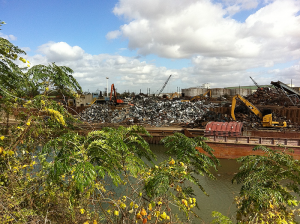Air Quality Watchdog Worried About Proposed TCEQ Standard Change
From Houston Public Media:
There are more than 100 metal recycling plants in Houston, several of them in the East End along the ship channel.
Rod Gonzalez lives in the Magnolia Park neighborhood, not too far from some of them. He just moved here three months ago from south Texas, and he said Houston’s air feels different from what he’s used to.
“It’s definitely a different quality of air,” he said. “You know, I do experience a lot of allergy and watery eyes, and sometimes I don’t really know if it’s actually, you know, nature or my allergies or if it’s something that’s triggering it.”
There is no telling if this has to do with the recycling plants in the area but what is known is that tests have found higher than usual levels of hexavalent chromium, also called Chrome VI, in the air around these plants. Chrome VI is a metal air pollutant and has been found to increase the risk of lung cancer in workers exposed to it on a daily basis.
That’s why Adrian Shelley of the Air Alliance Houston is worried about a change in the Chrome VI standards by the Texas Commission on Environmental Quality.
“While we see that the TCEQ has reduced the long-term standard, it is actually increasing — or proposing, I should say, to increase — the short term, the 24-hour, standard by almost 13 times what it is today,” Shelley said.
The Air Alliance is now scrambling to spread the word about the proposal and submit comments by May 6, when the public comment period ends.
“First of all, we just want to understand why the short-term standard is proposed to increase so dramatically,” Shelley said. “We want to understand how the health impacts of chromium VI were evaluated here. We want to understand what the potential health impacts could be to our vulnerable communities of this rule taking effect.”
But Michael Honeycutt, chief toxicologist at the TCEQ, said the public has had plenty of time to look into the proposal.
“In August of 2011, we put a notice out on our website and we also sent out a notice on our listserv that we were going to start looking into the Chromium VI ESL,” Honeycutt said. “And we actually asked for people to submit information to us to consider in that process.”
Honeycutt said the TCEQ also published peer-reviewed scientific papers on the subject.
He said the long-term standard is the more important one, and that one will be tightened.
“Because a company would need to meet both of those, the net result is actually, the value would be more stringent,” Honeycutt said. “So it may appear that we’ll be more lenient, but actually, when it’s all said and done, it’ll be more stringent.”
Shelley said that makes no sense. He said the new short-term standard will allow a year’s worth of Chrome VI exposure at the long-term levels in a little more than a day.
The public can submit comments to this and other TCEQ proposals on the agency’s website.

